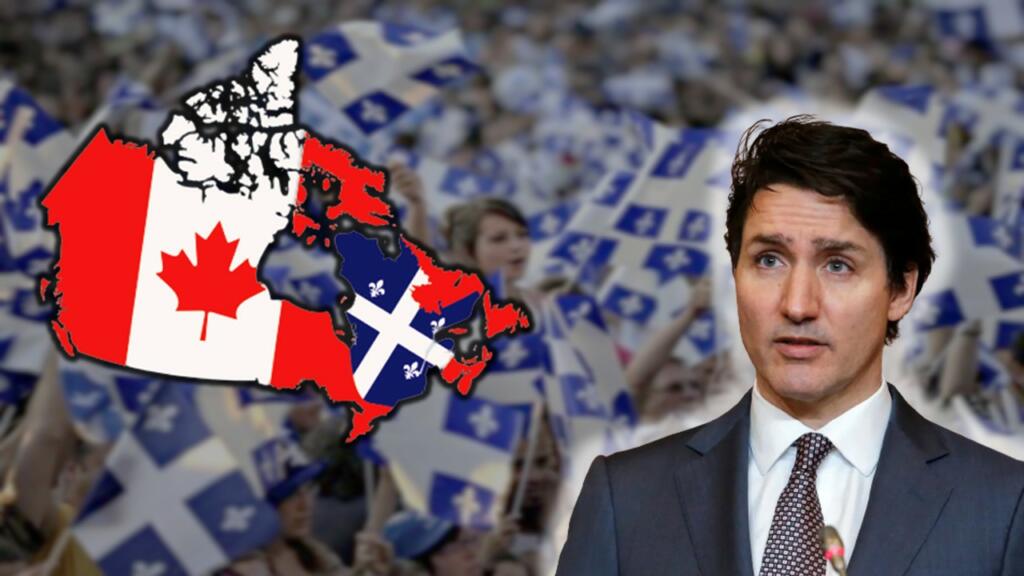Looks like Nero is reborn, in the form of Canadian PM Justin Trudeau! We’re not making this up, as PM Trudeau is busy ‘antagonizing’ and attempting to gain sympathy on the lines of Ukrainian buffoon Zelensky; however, none is actually buying his claims.
To make matters worse, Canada has been a long-time supporter of Khalistani separatists. So much so, Justin Trudeau’s father, Pierre Trudeau, had refused India’s request for the extradition of Khalistani terrorist Talwinder Singh Parmar, chief of Babbar Khalsa. Parmar continued to live in Canada and planned the Kanishka bombing, in which 329 people were killed, including 268 Canadians.
While Canada has supported the separatism movement against India, its backyard is not as silent as it may look. For decades, the residents of Quebec have been asking for a separate nation. Most of Quebec is predominantly French, and there have been two referendums already, the second of which Canada won only by a margin of around 54,000 votes.
Trudeau’s Accusations and Canada’s Troubled History
Prime Minister Justin Trudeau’s recent accusations and posturing on the international stage have raised eyebrows and stirred controversy. His claims and attempts to garner sympathy have drawn comparisons to other world leaders, like Ukrainian President Zelensky. However, many are skeptical of Trudeau’s motives and sincerity.
NOW – Canada's Trudeau is accusing the government of India of being behind a fatal shooting on Canadian soil — CNC pic.twitter.com/rp1PRyKHwz
— Disclose.tv (@disclosetv) September 18, 2023
Adding to the complexity of the situation is Canada’s historical involvement with Khalistani separatists. Notably, Trudeau’s own father, Pierre Trudeau, refused India’s request for the extradition of Talwinder Singh Parmar, the chief of Babbar Khalsa. Parmar, who resided in Canada, played a key role in planning the tragic Kanishka bombing, which resulted in the deaths of 329 people, including 268 Canadians.
Also read: Trudeau bites dust in gathering “international support” against India
Canada’s Internal Challenges: The Case of Quebec
While Canada may project an image of unity and stability, its internal dynamics reveal a different story. Quebec, a predominantly French-speaking province, has a long history of demanding separatism. This demand for a separate nation has been fueled by cultural and historical factors.
Canada’s history of colonization began in the 16th century when it was claimed by France. The French established the first permanent settlements in Canada, primarily driven by the lucrative fur trade. For nearly 150 years, Canada remained under French control.
However, in the 18th century, the British attacked Canada and defeated the French in the French and Indian War. This led to the division of Canada into Upper Canada (British) and Lower Canada (French). Today, Lower Canada is known as Quebec. Canada, as it is known today, was formed in 1867 with the passage of the British North America Act.
Roots of Quebec Separatism
The roots of Quebec separatism can be traced to the late 19th century, particularly after 1890. Before this period, the people of Quebec primarily engaged in agriculture and seasonal work related to the timber trade. However, economic and social changes in Quebec since the late 1800s played a significant role in shaping French Canadian nationalism.
The desire for greater provincial power within Canada’s federal framework was evident when the Union Nationale came to power in 1966. While this party remained fundamentally federalist, the emphasis shifted towards obtaining greater provincial autonomy. The spectrum of opinions within Quebec’s leadership ranged from advocating for special status within Canada to outright support for Quebec’s independence as a separate nation.
Also read: NIA goes out on “war mode” against Canada based fugitives
Trudeau’s Accusations: The Pot Calling the Kettle Black
In light of Canada’s own internal challenges and history of supporting separatist movements, Trudeau’s accusations against India and his cryptic references to backing Khalistani separatists raise questions and irony. Accusing another nation of meddling in internal affairs while grappling with its own separatism movements is akin to the pot calling the kettle black.
NOW – Canada's Trudeau is accusing the government of India of being behind a fatal shooting on Canadian soil — CNC pic.twitter.com/rp1PRyKHwz
— Disclose.tv (@disclosetv) September 18, 2023
The recent accusations and posturing by Prime Minister Justin Trudeau have placed Canada’s own history and internal challenges under the spotlight. While Trudeau may attempt to gain sympathy on the international stage, it is essential to consider the complex historical context and Canada’s own struggles with separatism. As the saying goes, before casting stones, one must first look at their own house.
Support TFI:
Support us to strengthen the ‘Right’ ideology of cultural nationalism by purchasing the best quality garments from TFI-STORE.COM.
